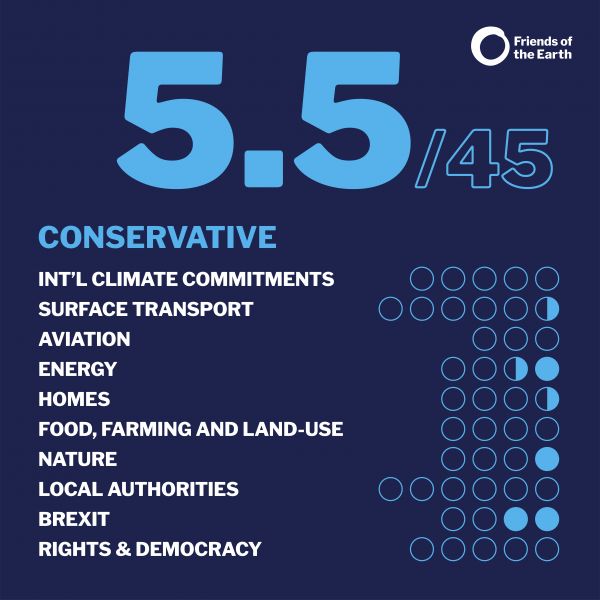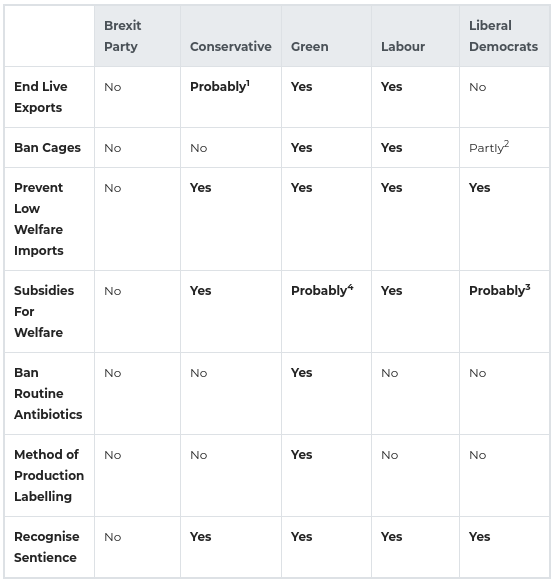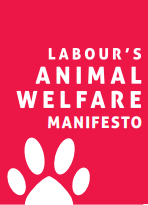
This is your guide to the 2019 climate change election. We are in the midst of a climate emergency: living in such desperate times surely calls for desperate measures…. but the choice in the ballot box is the same as always.
Or is it?
Here is Anna’s guide to the 2019 election with a focus on the climate catastrophe and animal welfare. This election might be our last chance on climate change so I have been more … forthright… that I usually am in the public sphere. Hope that’s okay!
Below is a detailed review of 5 party manifestos, in alphabetical order.
I have included:
- Quotes from each manifesto
- Quotes from Friends of The Earth and Compassion in World Farming
- Some thoughts of my our own! These are either on a pink background or in (italics/brackets)
- Also, I used the Nature Watch Foundation election report as a guide
SuMmary of all manifestos
Labour and the Lib Dem’s have similar sized and rated climate policies, but with a very different approach: Labour’s policies are rooted in jobs and local decision making and the Lib Dems are not.
Both Lib Dem’s and Labour will force government and the financial sector to consider the climate impact of every decisions, but Labour’s plans are more aggressive. Additionally, Labour has a very extensive animal welfare policy and puts climate policy at the top of their agenda.
The Lib Dem’s and Greens both have a simplified 3-4 point plan for averting the climate catastrophe which is missing from both Labour and Conservative manifestos.
The Conservative government is behind on implementing existing recommendations. In their manifesto they have some animal welfare and climate policies – but what they say is scattered about and makes worryingly little sense. The Brexit Party have almost no policy on climate and no policies on animal welfare.
The Conservatives and Lib Dem’s don’t offer a clear narrative on how climate change has come about and how it relates to every day life. Conversely Labour and the Greens have a shared narrative that unregulated capitalism is a/the cause of the climate catastrophe and so the solution must, by definition, result in a more equal distribution of wealth and power. However they differ on nuclear power: Labour are in favour and the Greens are against.
Personally, I think that (on climate) the Labour manifesto is much like the Green manifesto, but with the weight of 90 more years experience behind it. The policies are similar but the approach is based on a deeper understanding of how decisions get made. This is not to dismiss the work of the Greens – really it’s a testimony to them: their sort of policies are now mainstream!
Based on the manifestos it is clear that voting Conservative or Brexit Party means not just prioritising Brexit over climate, but basically ignoring the climate catastrophe. They have given us a clear choice – Brexit or the planet.
Climate Election Manifestos In Numbers
How many words till…
This table shows how many words after the title/table of contents etc till we find our key words, Animal, Climate and Environment. I included environment alongside the more focused word climate because it seems to be favoured by the Brexit and Conservative parties.
| Party | Animal | Climate | Environment |
| Brexit | n/a | n/a | 759 |
| Conservative | 1032 | 3824 | 1271 |
| Green | 8340 | 29 | 31 |
| Labour | 5401 | 66 | 67 |
| Lib Dem | 11,844 | 182 | 1416 |
How many mentions of each word?
| Party | Animal | Climate | Environment |
| Brexit | n/a | n/a | 2 |
| Conservative | 10 | 10 | 22 |
| Green | 36 | 64 | 39 |
| Labour | 6+78 | 60 | 78 |
| Lib Dem | 13 | 61 | 49 |
How many trees?
This is some tree math from Friends of The Earth [Reference]. They say we need to aim for a doubling of tree cover by 2050, and Labour are the only party to propose this target.
| Party | Trees per year (million) | Hectares by 2050 (million) | Increase in % of UK tree cover |
| Brexit | ? | ? | ? |
| Conservative | 30 | .9 | 3.25 |
| Green | 70 | 2.1 | 8 |
| Labour | 60 rising to 140 | 3 | 12 |
| Lib Dem | 60 | 1.2 | 4.5 |
Brexit Party on Climate and Aniaml welfare
- Does not mention climate in manifesto
- Does not mention animals in manifesto directly
- Used the word environment twice
Climate Catastrophe
- Plant “millions of trees” to capture CO2 and promote a “global initiative at the UN”
- Make it illegal for waste to be exported across the world to be burnt, buried, or dumped at sea: we will recycled our own (doesn’t say how)
- …. yes, that’s everything….
Animal Welfare
According to Compassion in World Farming the Brexit party WILL NOT:
- End live exports
- Ban cages
- Prevent Low Welfare Imports
- Subsidies For Welfare
- Ban Routine Antibiotics
- Method of Production Labelling
- Recognise Sentience
(I.E they have no policy on animal welfare)
Other relevant policies
- Invest £2.5bn in our Fishing and Coastal Communities
Sources: The Brexit Party, Naturewatch, Compassion in World Farming
COnservative PArty ON CLIMATE AND ANIAML WELFARE
The Conservatives are in power. The Committee on Climate Change (CCC) which oversees the work of Parliament on climate has said:
“Last June, we advised that 25 deadline policy actions were needed for the year ahead. Twelve months later, only one has been delivered by Government in full. Ten of the actions have not shown even partial progress. Government continues to be off track for the fourth and fifth carbon budgets – on their own appraisal – and the policy gap has widened further this year as an increase in the projection of future emissions has outweighed the impact of new policies.” [Reference]
The Conservative manifesto does not mention climate or environment in the table of contents. First mention of climate is on page 12 (3825th word after contents page). The first mention of animal is page 5 (1033rd word).
Animal and climate are both mentioned 10 times: environment is mentioned 22 times, however, some uses are in the context of social/built rather than natural environments (and it’s still used less than Labour’s 78 and Lib Dem’s 49 mentions). Basically, they talk about the climate catastrophe much less than the other parties.
Climate Catastrophe
Conservation is, and always has been, at the heart of Conservatism. Our Government’s stewardship of the natural environment, its focus on protecting the countryside and reducing plastic waste, is a source of
immense pride. But today, the climate emergency means that the challenges we face stretch far beyond our borders. Thanks to the efforts of successive
Governments, the UK has cut carbon emissions by more than any similar
developed country. We are now the world’s leader in offshore wind – a
fantastic success story of Government and the private sector working hand
in hand to cut costs and deliver ever more electricity at plummeting costs.
Unlike Jeremy Corbyn, we believe that free markets, innovation and prosperity can protect the planet.
Friends of the Earth said “Despite the Conservative Party manifesto including decent policies on plastics and agricultural subsidies, and a restatement of the moratorium on fracking, in sector after sector its commitments were invariably weaker than the other parties, entirely absent or just plain bad (take the road building programme, for example). Overall, their manifesto comprehensively fails to address the climate and nature emergencies, which are hurting communities right now and will deliver catastrophe in the future.”
Only 16 of 572 candidates took the Friends of the Earth pledge to make climate a priority in parliament (as of 8/12/19)
The Friends of The Earth review is really bad, so I took a look myself to make sure it’s not just biased. I tried to objectively understand the manifesto page(s)? on climate.
Without climate in the table of contents, I had to use a key word search: sections that feature climate policies include “Unleash innovation”, “Stewards of our environment”, “Fight climate change and protect the environment”, “Support rural life and coastal communities”, “Increase trade and prosperity” and “Places we want to live in”.
The polices are dotted about in a way that is difficult to understand and they often include things not related to climate, or are in sections about other things.
It could be argued that this shows an integrated approach, where climate change is a factor in many policy areas. However, if this is the case, why don’t the Conservatives propose that climate should be considered during all legal and financial decisions (as the Lib Dems and Labour both do)?
Here are some of the policies I found using keyword search:
- We will support the creation of new kinds of homes that have low energy bills and which support our environmental targets and will expect all new streets to be lined with trees (page 33)
- We will use our £1 billion Ayrton Fund to develop affordable and accessible clean energy that will improve lives and help us to lead the world in tackling climate change (page 42)
- In return for funding [farmers] must farm in a way that protects and enhances our natural environment (page 42)
- We will invest in nature, helping us to reach our Net Zero target with a £640 million new Nature for Climate fund (page 45)
- We […] will introduce a new levy to increase the proportion of recyclable plastics in packaging (page 45)
- We will introduce a deposit return scheme to incentivise people to recycle plastic and glass. (Page 45)
- We will lead the global fight against climate change by delivering on our world-leading target of Net Zero greenhouse gas emissions by 2050, as advised by the independent Committee on Climate Change [and] we will use our position hosting the UN Climate Change Summit in Glasgow in 2020 to ask our global partners to match our ambition (page 57)
- We will set up new international partnerships to tackle deforestation and protect vital landscapes and wildlife corridors (page 57)
- We will help lower energy bills by investing £9.2 billion in the energy efficiency of homes, schools and hospitals (page 57)
- In all of our trade negotiations, we will not compromise on our high environmental protection, animal welfare and food standards (page 57)
I personally believe that the conservatives do not have a clear, organised or intelligible policy on the climate catastrophe. I am extremely concerned by this.
Animal Welfare
On animal welfare they say “High standards of animal welfare are one of the hallmarks of a civilised society. We have a long tradition of protecting animals in this country, often many years before others follow. Under a Conservative Government, that will continue – and we will continue to support such efforts overseas.” and “Conservation is, and always has been, at the heart of Conservatism. Our Government’s stewardship of the natural environment, its focus on protecting the countryside and reducing plastic waste, is a source of immense pride.”
Animal welfare is highlighted more than the climate catastrophe in the manifesto, it is given it’s own box and photo (of a man and a dog). Policies include:
- Introduce tougher sentences for animal cruelty
- Crackdown on the illegal smuggling of dogs and puppies (what about puppy farms?)
- Bring in new laws on animal sentience (specifically….?)
- End excessively long journeys for slaughter and fattening – one of the many benefits of leaving the European Union (No specific time mentioned)
- Bring the ivory ban into force and extend it to cover other ivory-bearing species, and ban imports from trophy hunting of endangered animals
- Ban keeping primates as pets
- Bring forward cat microchipping, giving cat owners peace of mind and increasing the measures we have available to tackle cat theft
According to Compassion in World Farming
The Conservative party WILL:
- Probably end live exports
- Prevent Low Welfare Imports
- Subsidies For Welfare
- Recognise Sentience
The Conservative party WILL NOT:
- Ban cages
- Ban Routine Antibiotics
- Method of Production Labelling
Sources: The Conservative Party Manifesto, Naturewatch, Compassion in World Farming, Friends of the Earth
GREEN PARTY ON CLIMATE AND ANIAML WELFARE

The Green Party, like Labour, puts the climate catastrophe first in the table of contents and proposes a Green New Deal.
There are 7 sub-sections and they do not include animal welfare as it’s own sub-section under climate. However, “Transforming our relationship with animals” is a subsection under the Green Quality of Life Guarantee (4th section of the manifesto).
Climate is the 30th word after the contents page and is mentioned 64 times. Animal is the 8341st word and is mentioned 36 times. Environment is mentioned 39 times.
Climate Catastrophe
On the climate catastrophe they say “In 2019, we face a collective challenge greater than we have faced for decades. The climate we all rely on is breaking down. The impacts are starting to affect us all – the weather is becoming more extreme, wildlife is declining, sea levels are rising. Our century is only 19 years old, but already we have had 18 of the hottest years on record. This summer saw the hottest day ever recorded in the UK, and the hottest month ever recorded across the world. None of this is happening by accident. It’s the consequence of an out-of control economic system that plunders the Earth’s natural resources to create wealth for the few, casting the climate
into chaos and causing corrosive levels of inequality. It’s time for a new start, so we have developed the Green New Deal. […]”
Friends of the Earth said “The Green Party… had a suite of policies which were consistently judged to meet, and sometimes exceed, Friends of the Earth’s policy demands. [The manifesto included] particularly strong policies on home energy efficiency and renewable energy, but scored lower than Labour overall.”
356 of 474 candidates took the Friends of the Earth pledge to make climate a priority in parliament (as of 8/12/19 – has the most as a percentage of candidates and in total)
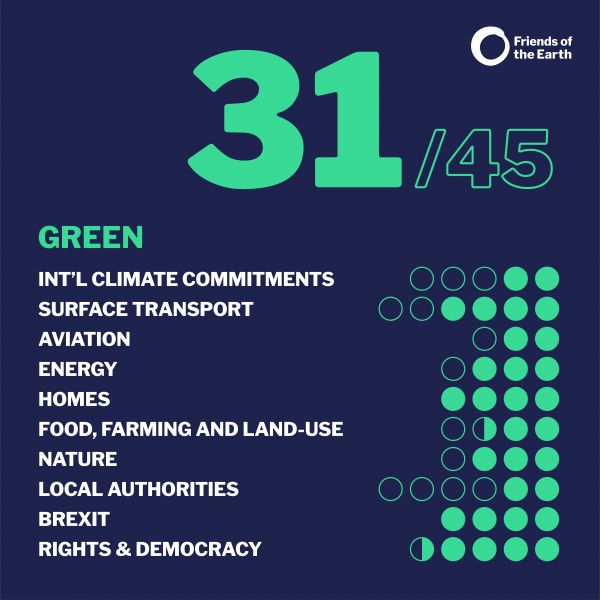
Key targets in the manifesto are:
“The Green New Deal will get the UK on track to reducing climate emissions to net zero by 2030 by:
- Meeting most of our energy needs through the domestic production of renewable energy
- Reducing our overall energy demand from buildings and homes
- Transforming UK industry, transport and land use
This simple overview of the strategy is missing from the Labour and Conservative manifestos’ (but present in the Lib Dem’s manifesto).
Personal policy highlights:
- Investment will be targeted at those who need it most, including communities with high unemployment […] and those dependent on old, energy guzzling, polluting industries
- Enable communities to develop their own renewable energy projects, so that the benefits of locally generated energy can stay local
- Transform the planning system so that it works to support a massive increase in wind power and other renewable generation and incentivises renovation over new build
- Remove subsidies to the oil and gas industries and apply a Carbon Tax on all fossil fuel imports and domestic extraction
- Connect our electricity supply more closely to that of our neighbours in Europe, to provide a wider supply
- We need to value energy as we value money: be more efficient
- Ensure all new and renovated homes meet the highest possible standards, meet social needs and are accessible without cars
- Ban advertising for flights (I like this) and tax frequent flyers (I like that that this penalises the poor less, but think a flat levy would be quicker to implement and could boost UK tourism to e.g. seaside communities)
- End the sale of new petrol and diesel fuelled vehicles by 2030 (much better than Lib Dem’s incentive based approach)
- Default 20mph speed limits in residential areas and 40mph on non residential minor roads (would take a lot of implementing, would be better to focus on reducing road traffic in general?)
- Ban the production of single-use plastics in packaging and extend the plastic bag tax to plastic bottles and single-use plastics (AND…)
- Manufacturers and retailers are required to pay the full cost of recycling and disposing (Same as Labour, better than Lib Dems)
- Use subsidies to move farmers to organic farming, agroforestry and mixed farming and away from intensive livestock farming plus jobs and better broadband in rural areas (good!) and enrage urban food growing/allotments
Animal Welfare
On animal welfare they say “We share this planet with, and are dependent on, a wealth of other animal species. Yet wildlife destruction, factory farming, live export, companion and domestic animal abuse, and the use of animals for experiments, sport and entertainment are all contributing to the systematic mistreatment of animals. We think it’s time for a better future, where animals are actively protected from cruelty and our own quality of life is improved too”.
The Green Party’s animal welfare section is short, clear and radical. They don’t have as many words as Labour’s separate Animal Welfare Manifesto but they have decisive actions in their primary document.
- Guarantee the principle of animal sentience
- Ban all hunting and end the badger cull
- Stop the use of primates, cats and dogs in research
- Enforce tougher regulations on animal transportation (inc 8 hour limit on transit) and end to live exports from our shores
- Create a new Commission on Animal Protection
According to Compassion in World Farming
The Greens WILL:
- Ban cages
- Low Welfare Imports
- Probably have subsidies For Welfare
- Recognise Sentience
- End live exports
- Ban Routine Antibiotics
- Method of Production Labelling
(100% of key CIWF policies)
Sources: The Green Party Manifesto, Naturewatch, Compassion in World Farming, Friends of the Earth
Labour PArty ON CLIMATE AND ANIAML WELFARE
Labours “Green Industrial Revolution” (The Green New Deal) is the first section of their Manifesto and is listed in the table of contents with 4 subheadings: Economy and Energy,
Transport, Environment and Animal Welfare.
Climate is the 67th word and is on page 6 (the first page with body text) and is mentioned 60 times.
The first mention of animal after the contents pages is on a dedicated page (5402nd word, page 25) at the end of the first section of the manifesto. Animal is mentioned 6 times, however, Labour also have an Animal Welfare manifesto that is separate to their main manifesto where animal is mentioned a further 78 times.
Climate Catastrophe
On the climate catastrophe they say: “This election is about the crisis of living standards and the climate and environmental emergency. Whether we are ready or not, we stand on the brink of unstoppable change. We must confront this change while dealing with the growing inequality and insecurity in Britain. Labour led the UK Parliament in declaring a climate and environmental emergency. The next Labour government will lead the world in fighting it, with a plan to drive up living standards by transforming our economy into one low in carbon, rich in good jobs, radically fairer and more democratic. The climate crisis ties us all into a common fate. This election is our best hope to protect future generations from an uninhabitable planet. The Intergovernmental Panel on Climate Change has said we need to cut global emissions in half by 2030 to have a chance of keeping global heating within safe limits – that means acting now, and acting decisively.”
Friends of the Earth rated Labour in first place, and say: “The Labour Party manifesto from the start contained very strong, funded policies on home energy efficiency and renewable energy. Additional environmental commitments were subsequently announced during their election campaign, including an ambitious pledge on tree planting, a detailed policy on food and commitment to strong environmental law and enforcement in its “Plan for Nature”, plus significant public transport and cycling announcements.”
279 of 571 candidates took the Friends of the Earth pledge to make climate a priority in parliament (as of 8/12/19)
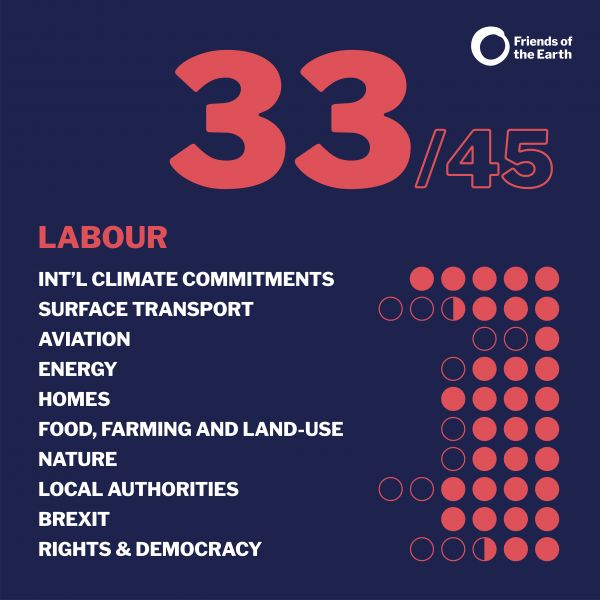
I think the Labour Manifesto is extraordinary reading: there are 17 pages of detailed policies. There has been a lot of focus on the feasibility of the huge investment proposed, but actually many of the policies are not about money at all, but about accountability.
My personal highlights include:
- Asking the Office for Budget Responsibility to add the cost of not acting into every fiscal decision
- Rewriting the Treasury’s investment rules so every penny spent by government will be compatible with climate targets
- Change the criteria a company must meet to be listed on the London Stock Exchange: any company that fails to contribute to tackling the climate emergency will be delisted (WOW)
- Make producers responsible for their waste and recycling/disposal which will encourage sustainable design and manufacturing
Additionally:
- All their big investment policies, including transport, are to be dealt with regionally, governed by local representatives rather than from Westminster. Money will be distributed evenly across UK and a key part of the treasury will be located in the North
- They will make climate targets and data include the footprint of imported goods
- Create a Climate Apprenticeship programme
- Creation of Council owned bus networks and reinstating 3000 bus routes that have been cut and full electrification of rail networks
- Move freight from planes to rail and promote cycling and walking as modes of transport
- New national parks
- Introduce a “Right to food” and end the need for food banks
- Almost every policy is tried to manufacturing, industry, jobs/pay and also health and social policy regarding women/BAME etc…
Animal Welfare
On animal welfare the manifesto says “Labour has published an ambitious animal welfare manifesto which reiterates our commitments to prohibit foxhunting and end the cull of badgers. In England, we will introduce an animal welfare commissioner, prohibit the sale of snares and glue traps, end the badger cull and ban the keeping of primates as pets. We will work internationally to end commercial whaling, ban the importation of hunting trophies of threatened species, and boost police resources to tackle rural and wildlife crime”
Labour have a separate, pre-exiting manifesto on Animal Welfare. Policies include:
- Appoint an independent Animal Welfare Commissioner with the objective of ensuring that animal welfare standards are always considered in legislation and international affairs.
- Enshrine the principle of animal sentience in law
- Expand the definition of animal to include decapod crustaceans (this would end the practice of lobsters being boiled alive) and cephalopods (for example squid)
- Remove two-tier sentencing for animal cruelty so that all animals (domestic, famed or wild) are protected by the same five-year maximum sentence for animal cruelty
- Stop animals being abandoned or given to rescue due to housing: tenants can keep pets as a default, animals may go into care-homes or sheltered accommodation with their elderly/sick/homeless owners
- Ban live exports for slaughter and fattening, imports of Foie Gras and fur and sale/use of snares and glue traps
- Ban cages and farrowing crates (used to cage pigs from labour to weaning)
- Strengthen hunting bans and end badger cull
- A long-term objective to phase out animal testing entirely and contribute to exploring of alternatives
Compassion in World Farming say
The Labour party WILL:
- End live exports
- Ban cages
- Prevent Low Welfare Imports
- Subsidies For Welfare
- Recognise Sentience
The Labour party WILL NOT:
- Ban Routine Antibiotics
- Method of Production Labelling
Sources: The Labour Party Manifesto, The Labour Party Animal Welfare Manifesto, Naturewatch, Compassion in World Farming, Friends of the Earth
LIBERAL DEMOCRAT PARTY ON CLIMATE AND ANIAML WELFARE

The Liberal Democrat Manifesto lists the climate catastrophe in the table of contents. It’s the fourth section, after Brexit, economy and education.
There are 10 subheadings which include Animal Welfare. Climate is the 183rd word after the contents page and is mentioned 61 times. Animal is the 11,845th word and is mentioned 13 times.
Climate Catastrophe
On the climate catastrophe they say “The UK should be leading the world in tackling the climate emergency. We are the first generation to know we are destroying the environment, and the last generation with a chance to do something about it before it is too late. There is no Planet B. If we fail to act, millions of people – at home and abroad – will suffer the impacts of foods, storms and heatwaves, rising food prices and the spread of diseases; the global financial system will be destabilised, poor countries could collapse and the number of refugees will soar” They then talk a lot about the other parties policies being bad and then say “The Liberal Democrats have the thought-through, deliverable plan for that new Green Future” then more criticism of other parties then finally (after 500+ words and 6 paragraphs!) they list some policies.
The phrase “first generation to know” is interesting, especially in the context of the school climate strikes. The following quote is from The Uninhabitable Earth by David Wallace-Wells:
“Global warming may seem like a distended morality tale playing out over several centuries and inflicting a kind of Old Testament retribution on the great-great-grandchildren of those responsible, since it was carbon burning in eighteenth-century England that lit the fuse of everything that has followed. But that is a fable about historical villainy that acquits those of us alive today—and unfairly. The majority of the burning has come since the premiere of Seinfeld. Since the end of World War II, the figure is about 85 percent. The story of the industrial world’s kamikaze mission is the story of a single lifetime—the planet brought from seeming stability to the brink of catastrophe in the years between a baptism or bar mitzvah and a funeral.”
Jo Swinson is 40 years old and so definitely not part of this “first generation” to know and keep burning fossil fuels anyway – and neither am I!
Friends of the Earth said “The Lib Dems … had a suite of policies which were consistently judged to meet, and sometimes exceed, Friends of the Earth’s policy demands. [The manifesto included] particularly strong policies on home energy efficiency and renewable energy, but scored lower than Labour overall.”
298 of 548 candidates took the Friends of the Earth pledge to make climate a priority in parliament (as of 8/12/19).
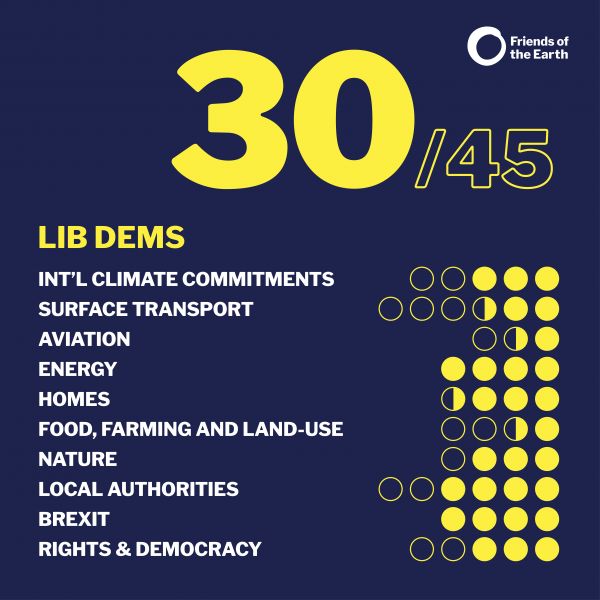
Their manifesto does spend a good deal of time on climate, around 13 pages. Unlike with Labour, the policies are not directly tied to jobs and living standards. However, there are mentions of climate outside of the core section, which may add this vital context.
They include some regional engagement plans, including the all important citizens assemblies, but this is less integral than in Labour’s manifesto. Regional power is actually really vital: local engagement in e.g. plans for wind farms make them more likely to succeed [reference].
The primary Lib Dem climate policies from the manifesto are:
- An emergency programme to insulate all Britain’s homes by 2030, cutting emissions and fuel bills and ending fuel poverty.
- Investing in renewable power so that at least 80 per cent of UK electricity is generated from renewables by 2030 – and banning fracking for good
- Protecting nature and the countryside, tackling biodiversity loss and planting 60 million trees a year to absorb carbon, protect wildlife and improve health
- Investing in public transport, electrifying Britain’s railways and ensuring that all new cars are electric by 2030
Other personal favourite policies include:
- Require all companies registered in the UK and listed on UK stock exchanges to set targets consistent with the Paris Agreement
- Regulate financial services (including pension funds) to encourage green investments
- Establish UK and local Citizens’ Climate Assemblies to engage the public in tackling the climate emergency
- All local authorities to have a zero carbon strategy
- Expand community and decentralised energy, support councils to develop local electricity generation and require all new homes to be fitted with solar panels
- Ban fracking
- Require all new homes and non-domestic buildings to be built to a zero-carbon standard
- Establishing a statutory waste recycling target of 70 per cent in England
- Invest in large scale restoration of peatlands, heathland, native woodlands, salt marshes, wetlands and coastal water
- Extend Britain’s rail network, improve stations, reopen smaller stations and restore twin-track lines to major routes
There are a few things in their manifesto that I acutely disagree with. For example, I think their idea to simply “ban single use plastic”, without a change in how waste is managed, can’t work. I believe this will lead to like-for-like “biodegradable” plastic alternatives being used across the board. These would then still be sent to landfill… where they CAN’T biodegrade.
Similarly, I don’t like their approach to decarbonising transport. It puts lower taxes on electric cars and low emissions zones at the top of the list – I believe these policies make life easier for the rich and harder for the poor.
Animal Welfare
On animal welfare they say “Liberal Democrats believe that all possible steps should be taken to promote animal welfare and prevent animal suffering, with better protection for animals, and full regard for animal welfare.”
The animal welfare policy section is only 215 words but does have some important commitments:
- Enshrine the principle of animal sentience in law
- Introduce stronger penalties for animal cruelty offences
- Ban the sale of real fur
- End the use of primates as pets
- Improve standards of animal health and welfare in agriculture, including a ban on caged hens
- Develop humane ways of controlling bovine TB, including by investing to produce workable vaccines (does not specifically ban badger cull)
- Minimise the use of animals in scientific experimentation, including by funding research into alternatives
- Legislate to ban the importing of hunting trophies where the hunting does not contribute to environmental protection (shows understanding of complex issue)
Compassion in World Farming say:
The Lib Dems WILL:
- Partly Ban cages
- Prevent Low Welfare Imports
- Probably have subsidies For Welfare
- Recognise Sentience
The Lib Dems WILL NOT:
- End live exports
- Ban Routine Antibiotics
- Method of Production Labelling
Sources: The Liberal Democrat Manifesto, Naturewatch, Compassion in World Farming, Friends of the Earth
Regional PArties ON CLIMATE AND ANIAML WELFARE
There is information on the animal welfare policies of DUP, Plaid Cymru and SNP on the Naturewatch website here. You can see who has pledged with Friends of the Earth here. The leaders of Plaid and SNP were in the climate debate (see below) and did very well – except on Veganism. Sorry I can’t do them all, I’m totally exhausted after all that reading!!
Conclusion: who should you vote for in the climate change election?
Labour, the Liberal Democrats and The Green Party all have world saving, game changing environmental and animal welfare policies. It’s probably best to vote tactically to elect as many of those parties candidates as possible: to see a recommendation for your constituency click here.
The conservatives do not prioritise the environment in their manifesto and are failing to implement vital changes now. The Brexit party do not have any substantial policy. If you are considering voting based on Brexit (leave) be aware that you could be voting against decisive action on the climate catastrophe.
Want to know more about climate in UK politics?
Watch the Climate Debate!
Read about Brexit and similar topics here.
NB: Not all parties are covered by some of the sources we used, e.g. Friends of the Earth only looked at Labour, Conservative, Lib Dem and Green.
I have done all the research writing on my own: I am not a journalist or scientist and I don’t have fact checkers to help me. There WILL be mistakes – it’s inevitable. I have tried to be balanced and have separated out opinion from fact as much as I can. I hope you find this article useful. Corrections and constructive feedback are appreciated
Declaration: I am a Labour member and supporting them via Momentum. I was briefly a Lib Dem Member (pre-coalition) and have voted Green in the past. I have at least 1 friend who is a Tory...



